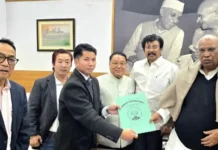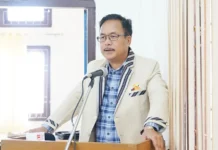NIRJULI, Dec 20: The state remote sensing application centre (SRSAC), in collaboration with the NERIST’s forestry department, organised an awareness programme on ‘Climate change and natural resources depletion impacts on socio-economy of Arunachal Himalaya: and indigenous and technological approach’ at the Kendriya Vidyalaya (KV) NERIST on Friday.
Addressing the 60 participants, including students, SRSAC Joint Director Liagi Tajo said “the programme is for local peoples of different age groups, representing various sectors of the society, to sensitize about climate change scenario and collect their views to identify the major causes for bioresources depletion, and to suggest suitable remedial measures through applied research, monitoring, evaluation and rigorous planning by the authorities.”
NERIST Director Prof HS Yadav emphasized on minimizing the misuse of natural resources, and said acres upon acres of land are deforested due to the growing needs of peoples. He also spoke on “emission of toxic gases as a result of pollution,” and highlighted various approaches for “facilitating freshwater, sustainable farming and storage facilities.”
Prof Yadav dwelt on food wastage, climate change, global warming, etc, and their impacts on aquatic flora and fauna and micro-organisms, and enumerated suitable conservation measures to mitigate the impacts of climate change.
Dr OP Tripathi said “climate change needs to be addressed precisely from local to landscape level,” and stressed the need for a “collaborative, community-based and participatory approach to respond to climate change.”
Dr Ashish Paul spoke about local problems like the gradual drying up of streams and springs, water pollution at higher altitudes due to anthropogenic activities, and the ever increasing plastic menace.
He also emphasized on preservation of indigenous food crops, domestic animals and traditional knowledge.
Dr PK Pandey encouraged the participants to “at least plant a sapling on their special occasions to get emotionally attached with nature.”
She spoke on the effects of climate change on the agricultural systems, and “how these ecosystems can naturally adapt to the change and ensure that the food security is not threatened.”
The onus of addressing the problem is also on the stakeholders, she said.
Research scholars from the NERIST’s forestry department, Dr Lobsang Tashi Thungon, Reetashree Bordoloi, Sangeeta Deka, Biswajit Das and Shilpa Saikia, interacted with the participants, presented videos, and encouraged the participants to work at the individual level to combat climate change. They also shed light on different activities that can be taken up in this respect.
Earlier, NERIST KV Principal Manaveer Singh Meena highlighted the importance of understanding the gradual changes in the local climate and their impact on bioresources. He encouraged the participants to seek to develop measures to minimize the impact.



